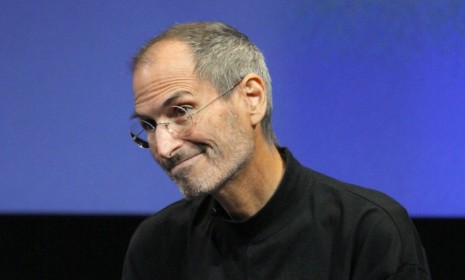Fortune's Apple exposé: Steve Jobs is a 'dictator,' and 3 other takeaways
A magazine story details the inner workings at Apple, including "extraordinary" details about what it's like to work for the visionary CEO

A free daily email with the biggest news stories of the day – and the best features from TheWeek.com
You are now subscribed
Your newsletter sign-up was successful
"How does Apple do it?" asks Adam Lashinsky in Fortune. The 35-year-old company has more than 50,000 employees and annual sales of close to $100 billion, yet it still manages to "churn out hit after hit" and grow 60 percent a year. In a nine-page profile of the secretive tech giant, Lashinsky examines the cult and culture of Apple, and paints "an extraordinary picture" of life at the company, says Charles Arthur in The Guardian. Here, four key takeaways:
1. Steve Jobs is a "corporate dictator"
The "exalted" CEO "makes every critical decision" at Apple and "oodles" of less-than-critical ones, too — "from the design of the shuttle buses that ferry employees to and from San Francisco to what food will be served in the cafeteria." And he makes it clear to his executives that excuses may be acceptable from janitors, but not from them. That "culture of responsibility" trickles down to other employees. "On a regular basis you either get positive feedback or are told to stop doing stupid shit," says one former designer quoted by Fortune.
The Week
Escape your echo chamber. Get the facts behind the news, plus analysis from multiple perspectives.

Sign up for The Week's Free Newsletters
From our morning news briefing to a weekly Good News Newsletter, get the best of The Week delivered directly to your inbox.
From our morning news briefing to a weekly Good News Newsletter, get the best of The Week delivered directly to your inbox.
2. And that makes Apple a "brutal and unforgiving place"
The company may seem "like a tech version of Wonka's factory" to outsiders, but it also has a "ruthless corporate culture." When Apple's MobileMe email system launched to poor reviews in 2008, Jobs tore into the team responsible for its development. He asked if anyone could tell him what MobileMe was supposed to do and, after getting an answer, asked "So why the f--- doesn't it do that?" It got worse from there. "You've tarnished Apple's reputation," Jobs reportedly said. "You should hate each other for having let each other down." He then immediately named a new executive to run the group. It's clear that "Jobs is not someone you want to disappoint," says the Daily Mail.
3. The company is also really paranoid...
A group called the Top 100 meets with Jobs every year "for an intense three-day strategy session" at a secret location, where Jobs prefers to have "good food and no golf course." Attendees aren't allowed to drive themselves — they ride in buses from Apple's headquarters. At the meeting site, rooms get swept for electronic listening devices in case competitors are trying to eavesdrop. "Fortune didn't mention whether Kool-Aid was served during the retreat," says Ian Paul at PCWorld.
A free daily email with the biggest news stories of the day – and the best features from TheWeek.com
4. ...And is preparing for life after Steve
Jobs, who remains on leave due to serious health problems, recognizes that the company must be able to continue without him. He created "Apple University" and hired business professors to write case studies of Apple decisions, so that younger managers could study them. Jobs is "ensuring that his teachings are being collected, curated, and preserved so that future generations of Apple's leaders can consult and interpret them," says Lashinsky. In a way, these case studies "sound less like tools for a business school course and more like a treasure equal to the Dead Sea Scrolls," says Ian Paul at PCWorld.
-
 Local elections 2026: where are they and who is expected to win?
Local elections 2026: where are they and who is expected to win?The Explainer Labour is braced for heavy losses and U-turn on postponing some council elections hasn’t helped the party’s prospects
-
 6 of the world’s most accessible destinations
6 of the world’s most accessible destinationsThe Week Recommends Experience all of Berlin, Singapore and Sydney
-
 How the FCC’s ‘equal time’ rule works
How the FCC’s ‘equal time’ rule worksIn the Spotlight The law is at the heart of the Colbert-CBS conflict